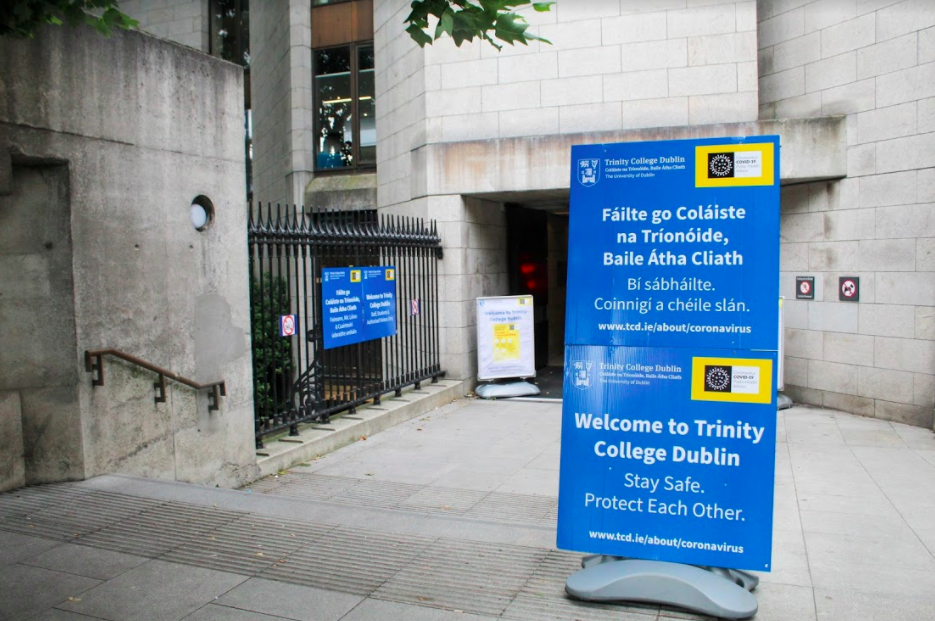My appointment as Sinn Féin Spokesperson for the new department of Further and Higher Education, Research, Innovation and Science this summer coincided with my eldest son Anthony completing second level and now starting at Trinity this week.
So, it’s not surprising that I have been fully immersed in Leaving Cert points, CAO places, student finance, accommodation and the safe return of third level.
Today, it was filing the crates with kitchen equipment, raiding the laundry cupboard and I was most impressed when he purchased his first ever bottle of washing up liquid!
At the same time, I am following the Covid-19 outbreaks in Scottish and English Universities. 500 students in isolation in Dundee Halls as well as eighty students and seven staff at Liverpool University. How are we going to minimise the risks on and off campuses here as 174,000 third level students crisscross the country each week? How are we going to ensure that the educational experience is a happy one and the quality of learning is preserved?
I believe this must be done in partnership with students, staff, unions and Government. At least 11 Universities in Britain and Scotland as well as Queen’s University Belfast have organised their own testing, tracing and tracking system. I believe this is a positive move. I learned from Trinity Associate Professor of Biochemistry Tomás Ryan at the Covid-19 Committee this week that Trinity is piloting “blanket testing” to combat Covid-19. I welcome this initiative and urge Government to provide all the necessary resources to ensure this happens in all our third level institutions.
We must be realistic about how campus life can be managed with Covid-19 and that needs to be clearly communicated to and understood by all students. The safe return of the student to third level needs to always be the utmost priority. At the same time, student fees need to reflect the impact public health measures will have on college education.
Students know there is a high degree of uncertainty inherent in the situation and that any plans or guidelines are liable to change as we grapple with the pandemic. Blended learning should have been accompanied by at least a modest reduction in fees (the highest in the EU) to show a recognition that the service they would receive would not be the same.
The real issue students and educators have is that this means lectures will be broadcast in one direction without student interaction. I am concerned about the impact of this disengagement and the possibility of higher failure rates. Online learning has been well researched even before the coronavirus, with most recognising substantial drawbacks and that’s even before we mention the Broadband word.
The Open University in Britain, which offers remote learning, only has a graduation rate of 13% far lower than conventional universities. The alternative to this learning style is online teaching in groups of 15 to 25. But this is far more expensive than providing a lecture to 300 students at a time. The economic and social cost of an increased dropout rate is far harder to measure – but likely to be severe.
Universities and colleges are in no position to deal with this alone. Successive governments have underfunded universities for over a decade. Third-level institutions are given 50% less funding per student than in 2008 – 72% less if we count for inflation.
They have been starved of public funding leading them to take on unsustainable amounts of debt, prioritise commercial activities and push the financial burden onto students.
Colleges do not have the financial resources to reduce fees without government intervention. Over a decade of underfunding means forced to find alternative sources of income from the private sector. Those sources of income have vanished overnight with the outbreak of Covid-19. Universities are looking at a €348 million loss of income, with International fees alone are estimated to go down by €181 million.
Students too have been hard hit by the coronavirus. A survey conducted in August by Sinn Féin that heard from over 1,000 students found that 70% of students said that their personal employment opportunities or income has been impacted by the pandemic and 56% of students said their household income had reduced. Students and their families deserve a break.
Thousands of students have been asked for deposits for accommodation before they had even received their timetables. Many students had already lost money when they were unable to get accommodation refunds at the start of the pandemic. Nowhere else would people be asked to pay for something they were instructed by Government not to use.
We have seen how fast things can change in a couple of days. The government would win a lot of goodwill from students and their families if fees were reduced and steps taken to ensure all deposits and rent for unused accommodation was returned. It hasn’t always felt like we are all in this together and that needs to change.
So, there are many challenges and opportunities ahead for students, families and University staff. Let’s all work together to make it a safe and successful year. Hopefully the love of learning will prevail, and joy will be found in the friendships made even in these strange times. Best of luck everyone.






